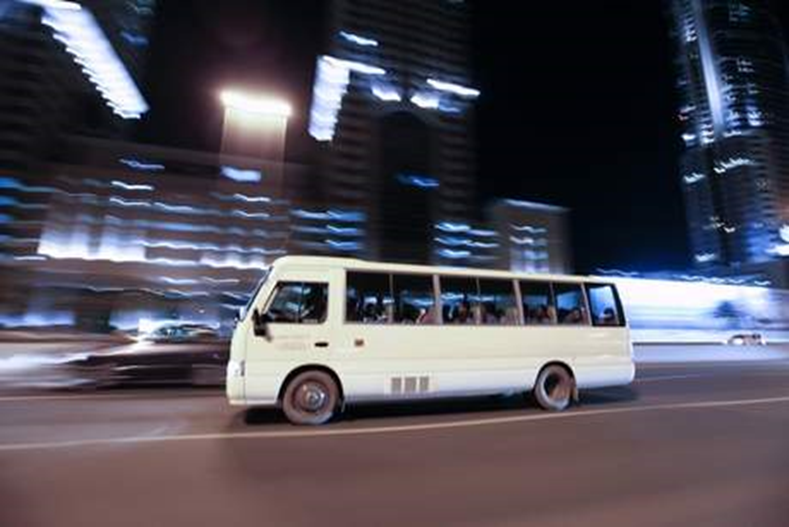Speed control devices on buses are reducing accidents but driver training and enforcement remain the key issues to improving safety, experts say.
The Ministry of Interior set a deadline of March 31 for all buses that carry up to 22 passengers to be fitted with devices that limit the vehicle’s speed to a maximum of 100kph.
The regulations apply in all emirates and to buses used by individuals or companies. Owners are required to prove they have installed the devices when re-registering their vehicles.
“Technology that reduces the rate of human error is important in reducing vehicle collisions,” said Dino Kalivas, the director of training at Emirates Driving Company in Abu Dhabi.
“Research indicates that excessive speed contributes to 20 per cent of road collisions. However, other factors such as driver fatigue, lane discipline, journey management, sudden deviation by drivers and driver distraction can increase the risk of collision by bus drivers.”
Speed limiters control the amount of fuel fed to the vehicle’s engine. When the speed goes above 100kph, a sensor decreases the fuel supply, which causes the vehicle to slow.
Jasim Al Marzouqi, executive director of the school transport center at Emirates Transport, which provides 4,200 buses for public schools, said limiters had reduced accidents, although he had no figures.
“Installing speed limiters helps improve transport safety and protect public property and has made the buses operate more efficiently,” said Mr Al Marzouqi.
“A combination of the latest technology and human elements are essential to keep the highest level of quality. Emirates Transport provides continuous training to its staff to ensure best practices.”
Courses offered to drivers include traffic safety awareness, adhering to the traffic rules and a commitment to passenger safety.
“Speed limiters for large occupancy vehicles make sense because of the large impact on human lives if they get into a crash,” said Dr Abdulilah Zineddin, a road safety specialist.
“However, monitoring the safety records of the drivers is equally important.”
Limiters may have a positive impact on safety, but they must be compulsory and enforced properly by the authorities. “Drivers need to be educated about such laws,” said Mr Zineddin.
Simply reducing a vehicle’s top speed can create its own problems if drivers don’t follow the rules of the road.
“I see so many drivers already driving above the speed limit being forced from the left lane into another lane where they have to suddenly slow because of a vehicle only going 90kph or 100kph in that lane,” said Glenn Havinoviski of Iteris, a US company that specializes in traffic management.
“But we have vehicles travelling too slow, usually small work trucks and buses. If they are not going the minimum speed, typically 80kph in Dubai, they need to be staying to the right, not blocking a middle lane. It makes it even more dangerous when you are trying to pass these vehicles at normal legal speeds because of the aggressiveness of other drivers.”
By June, officials at the Department of Transport in Abu Dhabi had approved and renewed more than 5,000 licenses for minibuses that complied with rules on limiters.
In the first seven months of this year there were 41 accidents involving light buses in Dubai, resulting in 9 deaths. There were 89 accidents and 7 deaths in the whole of last year.
Lt Omran Abdullah Al Hammadi, of Dubai Police’s Traffic Department, said most of the accidents were caused by speeding.
Abu Dhabi Indian School operates 16 buses fitted with speed limiters, said Vijay K Mathu, adviser to the board of governors at the school.
The use of the speed control devices has led to a reduction in accidents, he said. “However, our school transport department always caution the drivers to ensure they adhere to the designated speed limit set by the authorities,” he said.
“It is very important that the department holds regular workshops with our drivers and conductors to ensure that all rules and regulations are followed.”
Leens School and Kindergarten, which outsources its transport to a private company, has seven school buses, each with 20 seats. Speed limiters have been installed to stop them from going over 80kph.
“It’s a good thing but I don’t think our drivers used to cross the speed limit before the school buses were fitted with the device,” said Schuster Goveas, the school’s administrator.
“I’m confident of their driving capabilities. They safely drive our students to and from school, without any accidents.”
Kumar Sushil, a school bus supervisor in Abu Dhabi, said his company operates 10 33-seater buses and two nine-seater buses for Little Flower Private School in Abu Dhabi. Speed limiters have been installed in all its buses.
The 33-seater buses can go up to 80kph, while the maximum speed limit for its nine-seater buses is 100kph, he said.
“It’s good,” he said. “The school bus drivers will drive slowly but patience of other motorists on the roads is the main thing.”



